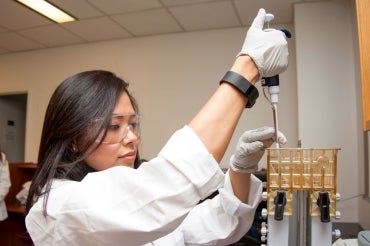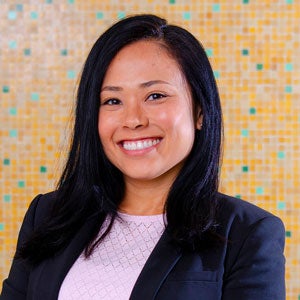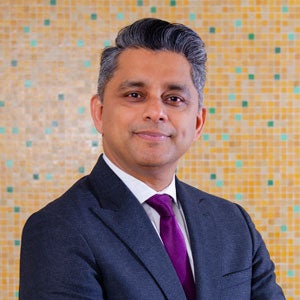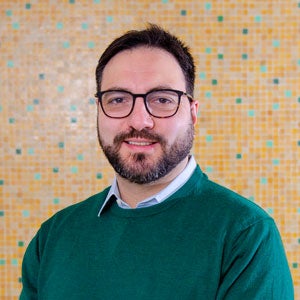From building bone to children’s literacy: 36 U of T researchers awarded Canada Research Chairs

Karina Carneiro, an assistant professor in the Faculty of Dentistry, is one of 36 researchers at U of T and its partner hospitals to receive a new or renewed Canada research chair (photo by Jeff Comber)
Published: August 29, 2023
At the University of Toronto’s Faculty of Dentistry, Karina Carneiro and her team are working on developing new treatments to regenerate bone with DNA-based biomaterials.

The researchers are exploring ways to use synthetic materials, created using DNA nanotechnology, to help bones regenerate and support the body’s efforts to heal them naturally.
That’s in contrast to current bone repair treatments, which involve taking bone tissue from another part of the body and breaking it into little pieces that can be inserted into the defect.
“Using a DNA-gel for this purpose could be an effective treatment option as it can be injected to fill the defect size fully,” says Carneiro, an assistant professor in the faculty.
“What we believe to be the difference between our DNA gel and other materials being developed is that over time, the DNA can degrade into molecules that promote our own body’s healing mechanism to further regenerate the bone.”
Carneiro is one of three researchers at the Faculty of Dentistry to be awarded a new or renewed Canada Research Chair in the latest round – and one of 36 across U of T’s three campuses and hospital partners (see list below).
Established in 2000, the prestigious federal program aims to recruit and retain top researchers and scholars in the country. It invests more than $300 million annually to enable world-class researchers to reach new heights in disciplines spanning engineering, health sciences, humanities and social sciences.
“Congratulations to all the researchers at the University of Toronto who received new or renewed Canada Research Chairs in the latest round,” says Leah Cowen, U of T’s vice-president, research and innovation, and strategic initiatives.
“From using AI to improve medicine and health care to better understanding Indigenous geographies and environmental dispossession, the work by U of T investigators supported by this important federal program is pushing the boundaries of research and innovation – and promises to have a big impact in Canada and around the world.”

Professor Anil Kishen, who is also at the Faculty of Dentistry, will use the funding associated with his Tier 1 Canada Research to advance his work in oral health nanomedicine.
He and his colleagues in the Kishen Lab are using multifunctional bioactive nanoparticles to study how cells communicate with each other and how wounds heal – in particular, how nanoparticles can be used to help save infected natural teeth and treat wounds and ulcers in individuals with diabetes.
Kishen says one of the reasons chitosan-based nanoparticles, which are optimized for different therapeutic applications, are so promising is because they’re derived from a naturally occurring molecule that is readily available.
“Affordability is important when developing a treatment to reach the masses,” Kishen says.

Massieh Moayedi, an associate professor in the Faculty of Dentistry, is receiving funding to pursue research in pain neuroimaging as a Tier 2 Canada Research Chair.
“There’s tenuous evidence that body image might be involved in some types of chronic pain,” Moayedi says, adding that his end goal is to understand how pain works so he can improve patient outcomes.
He’s already shown that people with arthritic hands who see the limb looking healthier through a special device experience improvements in pain, so he’s now trying to understand which brain regions are involved.
“This chair will give me funding and the capacity to allow me to investigate these questions, and to really understand the relationship between pain and body image.”
Randy Boissonnault, minister of employment, workforce development and official languages, announced the CRCs at a press conference on Aug. 29 on behalf of François-Philippe Champagne, minister of innovation, science and industry, and Mark Holland, minister of health.
He also revealed the researchers and projects receiving funding through a diverse array of programs administered by the Natural Sciences and Engineering Research Council of Canada (NSERC), the Social Sciences and Humanities Research Council (SSHRC) and the Canadian Foundation for Innovation (CFI).
They include the recipients of the SSHRC’s Partnership Grants, Partnership Development Grants and Insight Grants, as well as the recipients of the CFI’s John R. Evans Leaders Fund (JELF), which helps institutions to recruit and retain outstanding researchers, and provide them with the necessary tools and technology to perform their work. Named after a former U of T president, JELF supports projects that deal with a range of pressing issues. This year’s recipients include 35 researchers at U of T and its hospital partners sharing a total of more than $11 million for projects ranging from an assessment of plant responses to environmental change to the development of an ultra-sensitive cryogenic detector for dark matter and neutrino experiments.
“The federal government’s ongoing support for research through all of these programs – from the John R. Evans Leaders Fund, to the NSERC and CFI grants and the Canada Research Chairs – is critical to supporting the kind of research that ultimately improves lives through new knowledge and innovations,” Cowen said.
Here is the full list of new and renewed Canada Research Chairs at U of T:
New Canada Research Chairs
- Stephanie Ameis at the Centre for Addiction and Mental Health and in the department of psychiatry in the Temerty Faculty of Medicine, Tier 2 in neuroimaging of autism and mental health in youth
- Yvonne Bombard at Unity Health and in the Institute of Health Policy, Management and Evaluation in the Dalla Lana School of Public Health, Tier 2 in genomics health services and policy
- Karina Carneiro in the Faculty of Dentistry, Tier 2 in DNA-based biomaterials
- Jesse Chao at the Sunnybrook Health Sciences Centre and in the department of medical biophysics in the Temerty Faculty of Medicine, Tier 2 in precision cancer diagnostics and artificial intelligence
- Xi (Becky) Chen-Bumgardner in the department of applied psychology and human development in the Ontario Institute for Studies in Education, Tier 1 in literacy development of bilingual and multilingual children
- Mark Chiew at the Sunnybrook Health Sciences Centre and in the department of medical biophysics in the Temerty Faculty of Medicine, Tier 2 in computational biomedical imaging
- Sarah Crome at University Health Network and in the department of immunology in the Temerty Faculty of Medicine, Tier 2 in tissue-specific immune tolerance
- Michelle Daigle in the department of geography and planning in the Faculty of Arts & Science, Tier 2 in Indigenous geographies and environmental dispossession
- Karen Davis at University Health Network and in the department of surgery in the Temerty Faculty of Medicine, Tier 1 in acute and chronic pain research
- Rahul Gopalkrishnan in the department of computer science in the Faculty of Arts & Science and department of laboratory medicine and pathobiology in the Temerty Faculty of Medicine, Tier 2 in computational medicine
- Housheng (Hansen) He at University Health Network and in the department of medical biophysics in the Temerty Faculty of Medicine, Tier 1 in RNA medicine
- Margaret Herridge at University Health Network and in the department of medicine in the Temerty Faculty of Medicine, Tier 1 in critical illness outcomes and the recovery continuum
- Anil Kishen in the Faculty of Dentistry, Tier 1 in oral health nanomedicine
- Bowen Li in the Leslie Dan Faculty of Pharmacy, Tier 2 in RNA vaccines and therapeutics
- Iacovos Michael at Sunnybrook Health Sciences Centre and in the department of medical biophysics in the Temerty Faculty of Medicine, Tier 2 in tumor biology and precision oncology
- Massieh Moayedi in the Faculty of Dentistry, Tier 2 in pain neuroimaging
- Faiyaz Notta at the University Health Network and in the department of medical biophysics in the Temerty Faculty of Medicine, Tier 2 in pancreatic cancer and cancer evolution
- Valeria Rac at the University Health Network and in the Institute of Health Policy, Management and Evaluation in the Dalla Lana School of Public Health, Tier 2 in health system and technology evaluation
- Fahad Razak at Unity Health Toronto and in the department of medicine in the Temerty Faculty of Medicine, Tier 2 in health-care data and analytics
- Clinton Robbins at the University Health Network and in the department of laboratory medicine and pathobiology in the Temerty Faculty of Medicine, Tier 1 in cardiovascular immunology
- Lena Serghides at the University Health Network and in the department of immunology in the Temerty Faculty of Medicine, Tier 1 in maternal-child health and HIV
- Catriona Steele at the University Health Network and in the department of speech language pathology in the Temerty Faculty of Medicine, Tier 1 in swallowing and food oral processing
- Bo Wang in the department of computer science in the Faculty of Arts & Science and department of laboratory medicine and pathobiology in the Temerty Faculty of Medicine, tier 2 in artificial intelligence for medicine
Renewed Canada Research Chairs
- Angela Cheung at University Health Network and in the department of medicine at the Temerty Faculty of Medicine, Tier 1 in musculoskeletal and postmenopausal health
- Xi Huang at the Hospital for Sick Children and in the department of molecular genetics in the Temerty Faculty of Medicine, Tier 2 in cancer biophysics
- Cendri Hutcherson in the department of psychology at the University of Toronto Scarborough, Tier 2 in decision neuroscience
- Joanne Kotsopoulos at Women’s College Hospital and at the Dalla Lana School of Public Health, Tier 2 in hereditary breast and ovarian cancer prevention
- Arthur Mortha in the department of immunology in the Temerty Faculty of Medicine, Tier 2 in mucosal immunology
- Kelly O’Brien in the department of physical therapy in the Temerty Faculty of Medicine, Tier 2 in episodic disability and rehabilitation
- Trevor Pugh at the University Health Network and in the department of medical biophysics in the Temerty Faculty of Medicine, Tier 2 in translational genomics
- Diego Restuccia in the department of economics in the Faculty of Arts & Science, Tier 1 in macroeconomics and productivity
- David Sinton in the department of mechanical and industrial engineering in the Faculty of Applied Science & Engineering, Tier 1 in energy and fluids
- Olivier Trescases in the Edward S. Rogers Sr. department of electrical and computer engineering in the Faculty of Applied Science & Engineering, Tier 2 in power electronic converters
- Joel Watts in the Tanz Centre for Research in Neurodegenerative Diseases in the Temerty Faculty of Medicine, Tier 2 in protein misfolding disorders
- Michael Widener in the department of geography and planning in the Faculty of Arts & Science, Tier 2 in transportation and health
- Stephen Wright in the department of ecology and evolutionary biology in the Faculty of Arts & Science, Tier 1 in population genomics



